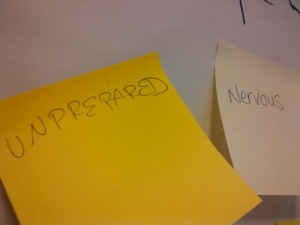Here are some of the answers my delegates give when they first arrive on my Confident Public Speaking Skills course.
When delegates first arrive on my Confident Public Speaking Skills and Professional Voice courses I ask them to take some post its and give their first honest answers to the question …
How do you feel about speaking in public?
Here are some of the answers my delegates give. The responses may feel familiar – and we tackle them all on the course:
The comfort zone
“…Really?! … Oh … Oh dear … Interesting! … Uncertainty … It’s a necessary evil … Apprehension – can I do it? … Please don’t make me do this – can anyone else do it? … Sorry I’m not in that day! … Can’t do it! – won’t do it … I’m not competent! … Do I have sufficient knowledge – questions from others that I can’t answer! … How many people looking at me! … What will others think? … OK if it’s not planned, i.e. talking about something that just comes up – a meeting – but if planned, very different … Okay – but depends on who I’m speaking to … Depends what the subject is … Out of comfort zone … Comfort zone being stretched … “
Our comfort zone is just that – where we feel comfortable. And speaking in public drags us out of that comfort zone and forces us into unknown territory. Worry about looking foolish and incompetent is very powerful and some of us will do anything to avoid it [including booking sick leave in advance … ]
Preparation
“ Oh joy! Well, if I have to – just don’t expect me to have anything prepared or it to sound good! … Time to prepare … How many people? Senior / junior etc? Powerpoint or flipchart? … Will I have time to prepare? … Think out of the box! … What will I say? … Do I know enough? … I’ll forget what to say! … I like to waffle, ramble and go off on a tangent … Will I go on too long? … “
There are ways to prepare successfully, with a simple set of tried and tested skills that will give you the best chance of success. We’ll explore how to start off with clear aim and objectives, develop, structure and rehearse your presentation with helpful speaking notes so you’ll have a good idea how long it should all take, keep yourself on track and stay focussed throughout.
“ … I want to deliver a good last sentence … “
How you end your presentation will be one of their most lasting memories. We’ll look at what to include in your introduction and conclusion as well as the main body of the presentation.
What would you like to achieve with your voice?
“… Become a more confident speaker … Confidence in voice … I would like to make better use of my voice and appear to sound more confident / commanding … Gain confidence to improve performance in future … Be better able to control meetings, be more authoritative …
“ … Be a more concise communicator – cut the waffle! … Not to hesitate – more eye contact, not just speaking to the page … Humour … ”
” … To understand more about my tone and pitch – where and how to improve … Learn appropriate pitch / tones of voice … Best pitch, tone, volume to use when presenting … Voice projection methods … ”
So much of our confidence or lack of it is apparent in the voice. Variety in pitch and tone, clear projection and a controlled pace all add authority and interest. Relaxation and breathing are key to producing the professional voice.
Nerves
“… Oh no! … Adrenaline – butterflies … Unsure – nervous at times … Always a little scared … A bit nervous … A little nervous … Apprehensive … Anxious … Nervous … NERVES … All eyes on me! … Adrenaline rush … Mind going blank … Want to run! … Gulp … Sick … Nauseous … PANIC … “
Our natural response to any stressful situation is that fight or flight response – what we call ‘nerves’.
Success
“… Interesting! … I love them as long as I have a responsive audience … Feel nervous but excited … Nervous excitement … Nervous but enthusiastic … Not a problem – who is the audience? What do they want me to talk about? … Subject? … Want to know when [but excited generally … Excited [yay!] at first, followed by panic … Comfortable / excited, eager to know the details … Excited but a bit nervous! … Nervous and excited at the same time. Probably 70% nervous, 30% excited … Excitement … Engage … “
We’ll look at why we get nervous when speaking in public, what nerves do to us physically and emotionally, and what we can do to minimise the ‘nerves’ and the ‘panic’ and encourage ‘excited’ and ‘enthusiastic’ instead.
And once you get over those nerves it’s quite possible that you could find yourself enjoying the chance to show what you can do, and seek out new opportunities for speaking well in public.
SWIP
